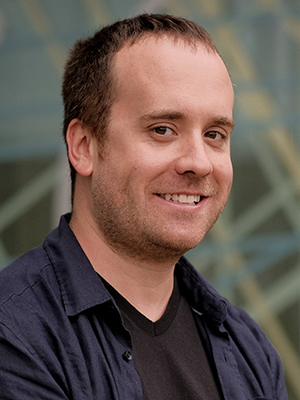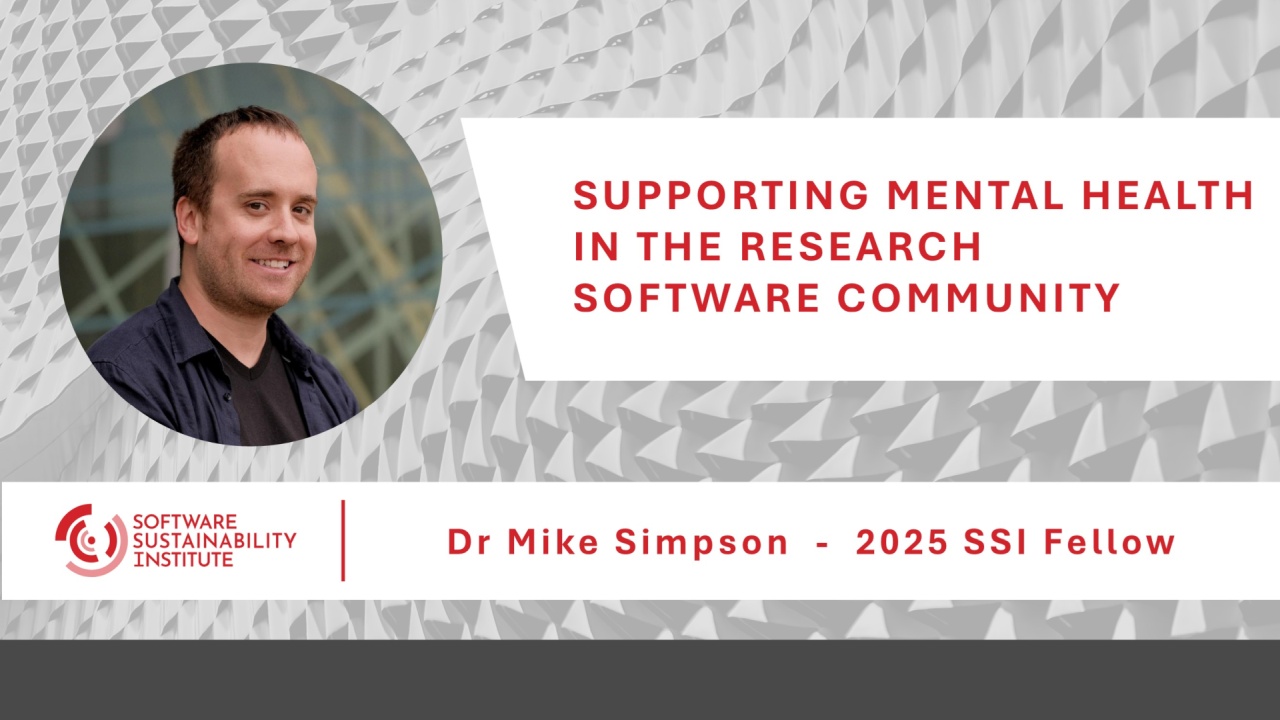Hello there! My name is Mike. I’m an RSE at Newcastle University, Trustee of the RSE Society and 2025 SSI Fellow.
For my SSI Fellowship, I will be continuing the conversation around mental health in our community and building upon the work of Dave Horsfall and the survey he conducted in 2022.
My plans include three main activities:
1. Telling my story - to help break the stigma around mental health.
2. Sharing tips and resources - to help people support their mental health.
3. Creating and supporting initiatives to improve mental health in our community.
In this post, I will discuss these plans in more detail and explain what made me want to do all this in the first place.
Trigger warning: This blog post describes my experience of mental health issues during the COVID-19 pandemic, including mention of an anxiety attack.
Why am I doing this?
I became a father in April 2020, at the beginning of the UK’s first lockdown of the COVID-19 pandemic. I was able to be there when my son was born but then had to leave them in the hospital to recover for the first two days of his little life. When I did bring them home, we had to learn how to be parents and deal with a range of health problems without any outside support. Meanwhile, I had to return to work (from home), and pressures continued to mount. It wasn’t long before I was burnt out and everything became too much to bear. The resulting anxiety attack meant I had to take two months off work and give up my other responsibilities. It took me a long time – and a lot of hard work and therapy - to recover physically, mentally and professionally.
That was the most challenging time in my life, and it isn’t easy to talk about it even now. But I want to share my story and what I learned from it - to try and make it less likely that this kind of thing will happen to anyone else. Those were exceptional circumstances, and a lot of what happened was out of my control, or anyone else’s. But I still think there are things we can learn from my experiences - and the experiences of others.
It is important to keep the conversation going. There is still a stigma surrounding mental health. It can be particularly daunting to discuss it with colleagues or your boss for fear that it might be seen as a sign of weakness. But I am not weak. Given the circumstances, I believe I actually handled it remarkably well. And my resilience comes from my previous experiences with mental health problems. I have developed tools to manage my condition, I know my limits, and I won’t allow myself to get into that situation again; I will raise a red flag and seek help before it becomes a problem. This is why it’s so important to smash the stigma, because keeping quiet and pretending that everything is OK only makes things worse in the long run.
There are many challenges facing our community that can affect our mental health. This industry is rife with context switching, imposter syndrome and a lack of career opportunities and recognition. These can lead to a range of issues, including anxiety, stress, burnout and depression. I think it's vital we do what we can to tackle these problems so that they aren’t the thing that drives people away from this profession. If we want research software to be more sustainable, we have to help sustain the people writing the software too!
So, what’s my plan?
There is no magic bullet, no one perfect solution that will improve the mental health of every RSE in the UK. But I believe I can make a difference in a number of ways.
Telling my Story
I hope that by telling my story, I can share some tips & advice, help people feel seen and help erode the stigma. I have prepared a talk to submit to the RSE Conference, which I hope to give at other events and institutions over the coming months.
This talk will include:
- My mental health story and what I learned from that experience.
- Tips for individuals to help look after themselves.
- Tips for managers on looking after their teams.
- What to do when things go wrong and where to get help.
- More details about my other plans for the Fellowship (as discussed below).
It will also include interactive elements to engage with the audience, whether they are in the room or online.
Providing Resources
I will be collaborating with Dave Horsfall and others to create a website that will serve as a hub for our efforts to support mental health in our community, which will include:
- The results of Dave’s Mental Health Survey.
- Definitions of common issues with links to additional information and support.
- A series of blog posts focussing on mental health stories and advice on self-care.
The idea of the blog is to encourage people to share their experiences (anonymously, if they prefer). Not all stories and advice will be relevant to everyone, but if they help or resonate with even a small section of the audience, then I believe it will have been successful.
Creating and Promoting Projects and Initiatives
Finally, I want to get involved with new and existing projects and communities related to mental health. I have submitted a lightning talk to CW25 to encourage people to consider mental health when developing plans for the Hack Day. I’m also hoping that we can run workshops or ‘Birds of a Feather’ sessions at other events.
To give you an example of the sort of thing I want to support, check out this post about Task Management for Humans as Self-care. This was the prize-winning idea from CW24, which involved teaching people about task management tools - not to make them more productive, but to improve their life-work balance and mental health. This is an example of a project that is probably of most interest to people with anxiety, ADHD or neurodiversity, and may not be relevant to everyone. However, if we can support several smaller projects like this, which help different subsets of the community or tackle specific problems, then they will add up to make a big difference.
Get Involved
If you have ideas for new projects, communities or other resources connected to mental health – or are part of existing ones and would like to collaborate - please get in touch. I’m also interested in collecting stories and blog posts from a diverse range of people and communities with different experiences.
Final Thoughts
So, that’s a brief summary of my plans for the Fellowship. I look forward to some interesting collaborations and discussions at CW25 and other events over the next year or so.
Hopefully, I’ll have more to share soon. Follow me and the SSI to keep up to date with news and announcements. Please get in touch (mike.simpson@newcastle.ac.uk) if you have any ideas, want to collaborate or would like me to present at your event/institution.
Thank you for reading.
Take care of yourselves!


